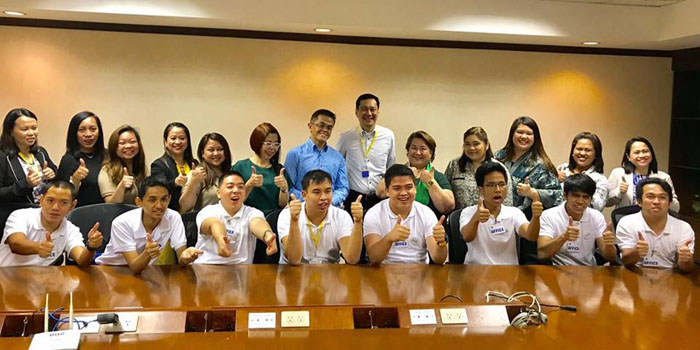
Highlights:
- Businesses now welcome as employees those with autism.
- Non-profit organizations help build employment opportunities for them.
MANILA, Philippines — Advocacy groups are helping promote the rights of persons with autism and their families but their benefits continue to expand as non-profit organizations are now pushing for career placements for them.
Autism Pinoy website, intended for families dealing with autism spectrum disorder in the country, said modern research no longer refers to it as a neurological or psychological problem. Instead, it cited that researchers now consider autism as a biological condition that involves genetic susceptibilities, environmental toxins, immune dysfunction, nutritional imbalances, and dietary sensitivities.
To promote autism acceptance and inclusion in the country, businesses are now open to accepting PWAs.
In 2016, mall giant SM began creating a workplace inclusion program for PWAs.
The mall, carrying SM Markets and its grocery shops including Supermarket, Hypermarket and Savemore, welcomed PWAs starting from one pilot store to 17 stores nationwide. The move was in partnership with non-profit organization Autism Society Philippines.
“Our PWA participants have gone a long way from displaying products on the supermarket shelves to becoming productive, improving their social skills, making more friends, inspiring other workers and delighting our customers,” SM Supermarkets shared in its Facebook page.
How PWAs are at work
Like some grocery shops, a cafe in Quezon City called Puzzle Gourmet Store & Cafe, also welcomes PWAs.
The cafe’s general manager, Ysabella Canoy, told Interaksyon that her family started the business late 2014 to give their brother Jose Canoy, who also has autism, an opportunity to experience how it is like to work. Her brother was then 20 years old and was treated like a normal employee with pay for the service he renders.
Ysabella said that after the autism-friendly cafe officially opened in April 2015, several parents and teachers of PWAs reached out to them and asked how PWAs can work for them. They then started to accept some of them as interns along with their full-time personnel.
Some of the PWAs are transition students who are training for adulthood. The youngest PWA they had was aged 17 while the oldest was 36.
Ysabella said she noticed that PWAs they have worked with develop their skills in the social situations.
Ysabella shared that working capabilities of the PWAs vary. Some can work for longer hours while others need to have diverse activities from time to time.
Customers of the cafe, whether loyal or walk-in, have also been accepting of the PWAs and were very patient with them. Most customers are well aware of the concept and they were supportive of it.
According to Ysabella, having seen how PWAs work, the possibility of autism becoming a norm in various workplace is highly likely.
“We have to remember that they are also people with own personalities, likes and dislikes. Some are fit for working in the corporate world while others are fit to working in customer service,” Ysabella said in mixed Filipino in a phone interview with Interaksyon.
“They have different personalities but if you respect their preference and place them in the work that they are interested in, they really can excel,” she added.
Career opportunities for PWAs being initiated
The Autism Society of the Philippines started the career placement initiative to build an “autism-OK Philippines.” The group aspires to create genuine employment opportunities in compassionate workplaces.
The organization said the model “empowers PWAs and their families towards success at work, through careful profiling of candidates, customized job matching, job coaching training and partnership with respected transition specialists and employers.”
ASP also holds Autism Works Open House to help find suitable career opportunities for PWAs in the retail, food service and BPO industries.
In its Facebook page, the ASP said it conducts occupational interest assessments on PWA candidates.

- Among the criteria for PWA applicants are the following:
- Aged 18 years old and above
- With formal autism diagnosis
- Must be willing to disclose diagnosis to employer.
- Must have received job readiness training or preparation in a school
setting - ASP member (can be completed upon placement)
The PWAs are also not bound by language as ASP also accepts those who speak English, Filipino and Cebuano—depending on the language the candidate was most comfortable with.
The cause of the autism advocate group for PWAs is backed by some Philippine laws.
The Section 5 or “Equal Opportunity for Employment” of the Republic Act No. 10524 or the Act Expanding the Positions Reserved for Persons with Disability states that “no person with disability shall be denied access to opportunities for suitable employment.”
The law likewise says qualified employees with disabilities shall be granted similar terms and conditions of employment including compensation, privileges, benefits, incentives, and allowances, among others.
“At least one percent (1%) of all positions in all government agencies, offices or corporations shall be reserved for persons with disability: Provided, That private corporations with more than one hundred (100) employees are encouraged to reserve at least one percent (1%) of all positions for persons with disability,” the law states.
The world is celebrating World Autism Awareness Day every April 2. The whole month also celebrates the World Autism Awareness.
For World Autism Awareness Day, the SM Markets urged its customers to help nurture a culture of diversity and inclusion by greeting their PWA personnel.









